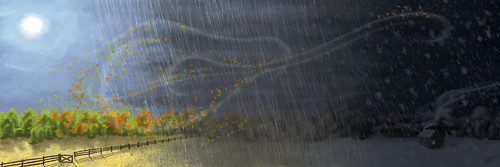And a lot of his music reflects that. But then... A lot of his music doesn't. Maggie May, for instance. It's such a fantastic cocktail of regret, wonder, nativity, hurt, and being in love. Gasoline Alley is a soulful pining to go home. Listen to the version from his Unplugged and Seated album, and tell me that there isn't something authentic behind his vocals.
I'm not really chalking myself up as a fan of the guy... But he certainly has produced a handful of gems. And I can't quite remember how I stumbled on it, but it wasn't too long ago that I discovered one of those gems - Mandolin Wind.
It's basically about a man who brought his wife with him to the frontier, away from luxuries and the comfort of an established town. He goes on to talk about the trials, particularly the "coldest winter in almost fourteen years", and how his companion stayed with him, and their love never faltered. It's a sort of ballad, I suppose. But it's very... Poignant. But it's still a love song - it's a man's testament to the woman he loves, that followed him into the unknown. Away from the refinement and romance of a mandolin, and into the arms of a simple man with a steel guitar. And, like Maggie Mae, all of this is hidden behind a series of major chords and upbeat rhythm. Rod, you sneaky bastard.

One of the latter verses goes:
I recall the night we knelt and prayed
Noticing your face was thin and pale
I found it hard to hide my tears
I felt ashamed I felt I'd let you down
This is where I started to look deeper into the story as a whole, and came on my interpretation. The whole song takes place at the wife's grave, where the husband is spilling out his heart to the woman that he let down. You see, the coldest winter in almost fourteen years claimed the life of who loved. And even in her last moments, nothing could change her mind or make her regret leaving the comforts that might have not lead to her end. And now the narrator is full of regret, and doing the best he can to manage on his own, knowing that his desire to make a go of things on their own resulted in losing the other half of himself. If you keep this in mind when you read through (or listen to) the lyrics, a lot of those lines really sting.
Now, if you'd like, you can tear my theory apart. I'll even tell you where to look - he says that he can rest assured that they had seen the worst, and later that he'll teach her to play his steel guitar. Those point to a pretty clear past-tense and a present tense where they are still together. So I'm most likely wrong. In fact, I'm pretty sure I am.
But.
This is the nature of art, no? Interpretation. Internalizing. And I'm a sucker for depressing tales and sad endings. So I like to think that this poor man, now out in the middle of nowhere on his own and deprived of the companion that had been with him for many years and many winters, is heart-broken. He's well aware that she has left him, but maintaining some sort of denial is the only way he has to cope with being alone, knowing that he killed her. So he talks to her regularly. He works all day in the field and then visits her grave at the end of the day, and stays there until it's far too late. In the scorching sun, and snow, and rain and sleet. I guess that sometimes there's a high price to be paid for being so completely in love.
-Cril
When the rain came
I thought you'd leave
Cause I knew how much
You loved the sun
But you chose to stay,
Stay and keep me warm
Through the darkest nights
I've ever known
If the mandolin wind
Couldn't change a thing
Then I know I love ya
Oh the snow fell
Without a break
Buffalo died
In the frozen fields, you know
Through the coldest winter
In almost fourteen years
I couldn't believe
You kept a smile
Now I can rest assured
Knowing that we've seen the worst
And I know I love ya
Oh I never was good
With romantic words
So the next few lines
Come really hard
Don't have much
But what I've got is yours
Except of course
My steel guitar
Ha, 'cause I know you don't play
But I'll teach you one day
Because I love ya
I recall
The night we knelt and prayed
Noticing
Your face was thin and pale
I found it hard
To hide my tears
I felt ashamed
I felt I'd let you down
No mandolin wind
Couldn't change a thing
Couldn't change a thing
No, no
Coldest winter
In almost fourteen years
Could never,
Never change your mind
And I love ya
Yes indeed and I love ya
And I love ya
Lordy I love ya
Rod Stewart - Mandolin Wind
No comments:
Post a Comment